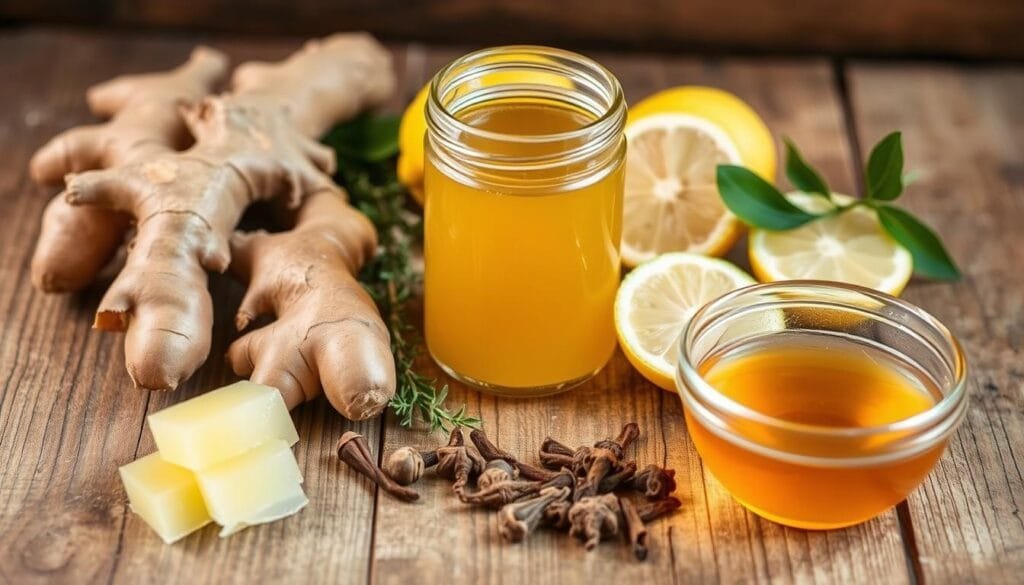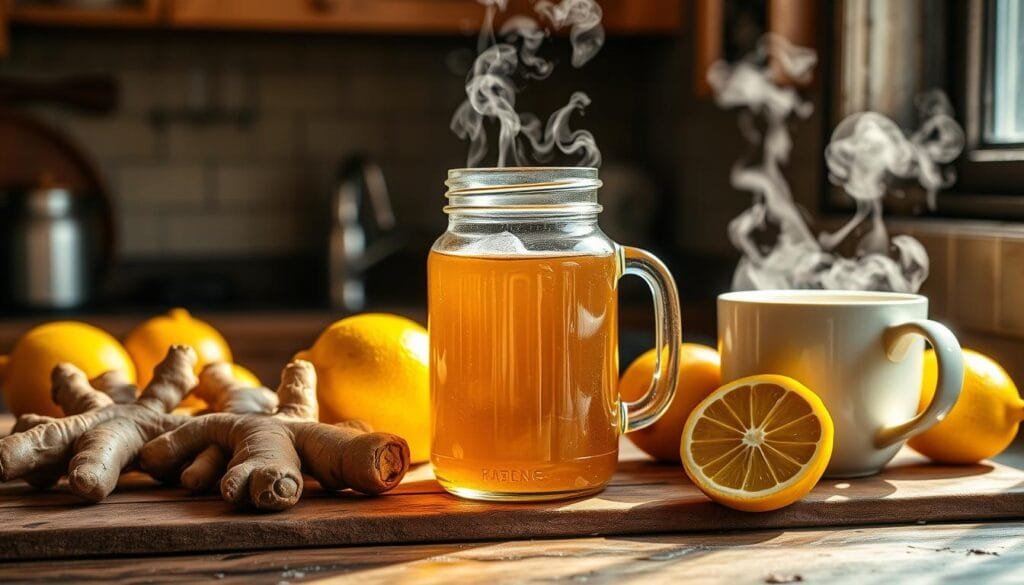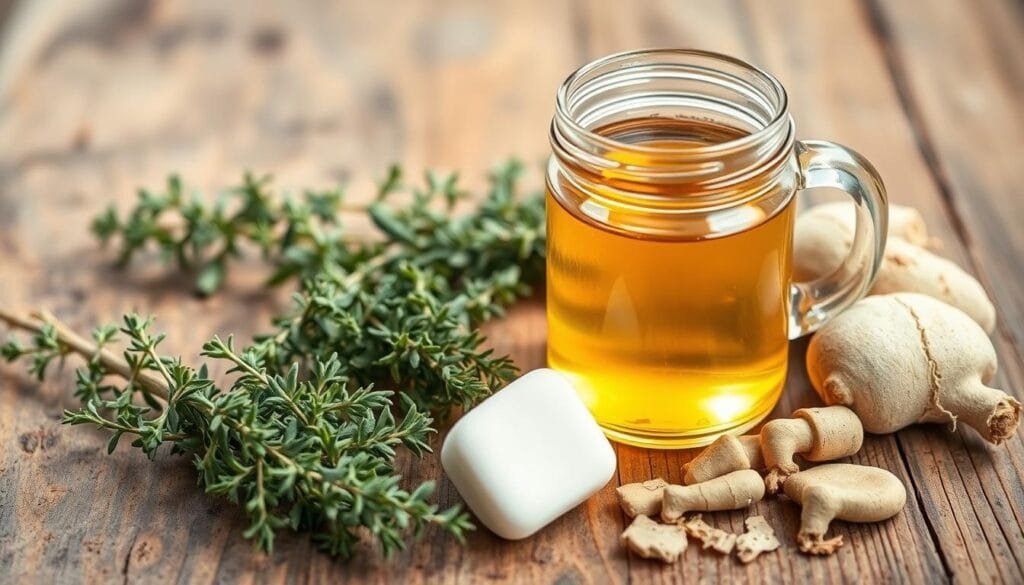I’ve dealt with a persistent cough and sore throat, and it’s really tough. But, you can make your own natural cough syrup at home. These homemade remedies not only ease coughing and throat irritation. They also boost your immune system with antioxidant-rich ingredients.
Unlike store-bought syrups, which often have artificial stuff, natural remedies are better. You can use honey, ginger, and herbs to soothe your symptoms. These ingredients nourish your body and are good for you.
In this guide, I’ll share some of the most effective and easy-to-make natural cough syrup recipes. You’ll learn about the therapeutic properties of the key ingredients. Whether you have a dry or wet cough, you’ll find a homemade remedy to help you feel better fast.
Understanding the Benefits of Natural Cough Remedies
Many people are now choosing natural and herbal cough remedies over over-the-counter medicines. These options offer several benefits. They are a good choice for those looking for a holistic way to manage coughs.
Why Choose Natural Over Store-Bought Options?
Natural cough treatments have ingredients that help soothe the throat and reduce inflammation. They also thin out mucus. Plus, they don’t have synthetic additives or harsh chemicals. This makes them a gentler choice, great for those with sensitive stomachs or who want to avoid medicines.
Key Therapeutic Properties of Natural Ingredients
- Ginger: Research shows that certain compounds in ginger root can relax airway muscles, easing coughing.
- Elderberry: Studies show elderberry extract may not stop coughs right away. But it can help them go away sooner.
- Herbal Blends: Mixing herbs like ivy leaf, marshmallow root, thyme, and aniseed in a syrup can reduce cough days.
- Honey: Studies found honey can lessen coughing in people with upper respiratory infections. It’s as effective as diphenhydramine, a common cough medicine.
Safety Considerations and Precautions
Natural cough remedies are great as a complement to traditional treatments. But, they should not replace prescribed medicines. Some ingredients may interact with health conditions or medications. They might not be safe for children or older adults. Always talk to a healthcare professional before adding new natural remedies to your routine.
“Higher-quality studies are needed to confirm the results of honey’s effectiveness in reducing coughing, indicating a need for further research in this area.”
Essential Ingredients for Homemade Natural Cough Syrup
Looking to soothe your cough naturally? Focus on ingredients that taste great and offer health benefits. Key components for homemade cough syrup include organic raw honey, organic extra virgin olive oil, and fresh lemons.
Organic raw honey is a strong ingredient. It has antimicrobial and antioxidant properties that soothe a sore throat. Buckwheat honey is more effective than over-the-counter cough medicines, great for young children with nighttime dry coughs. It also helps manage high blood pressure and cholesterol.
Extra virgin olive oil is full of antioxidants and healthy fats. It fights bacteria and relieves respiratory infections like the common cold. It can also lower the risk of heart disease, cancer, stroke, diabetes, and more.
Fresh lemons are packed with vitamin C. They boost the immune system and lessen cold symptoms like chest congestion and sore throat. Ginger calms the digestive system, soothes sore throats, and reduces inflammation.
Consider adding ground cinnamon and cayenne pepper to your syrup. Cinnamon fights cold and flu symptoms, while cayenne pepper thins mucus and soothes.
Adults and children should take 1-2 tablespoons of this syrup before bed. It helps reduce coughing and congestion at night. Use it as needed during the day. But, don’t give it to kids under 1 year old because of the honey.

“I made it through the holidays without any cough, sneeze, or fever, and I credit this homemade cough remedy for keeping me healthy. My oldest son even tried it and experienced quick relief from his cough. All three of my kids now request this remedy whenever they start coughing.”
The Power of Honey in Treating Coughs
When it comes to soothing a troublesome cough, natural remedies like honey can be highly effective. Honey is known for its antibacterial and anti-inflammatory properties. This makes it a strong natural cough suppressant.
Antibacterial Properties of Raw Honey
Raw, unprocessed honey has many beneficial compounds. These compounds give it antibacterial abilities. Studies show that certain honeys, like eucalyptus and citrus, can be good cough suppressants for upper respiratory infections and nighttime coughs.
How Honey Soothes Throat Irritation
The thick texture of honey coats and soothes the irritated throat. This reduces discomfort and helps stop the cough. Honey’s antimicrobial effects also help reduce inflammation and promote healing in the respiratory tract.
Proper Dosage and Usage Guidelines
Adults should take 1-2 teaspoons of honey up to 4-5 times a day. Children over 1 can have smaller doses. But, honey should not be given to infants under 12 months because of the risk of infant botulism.
Whether you have a dry or wet cough, honey is a powerful natural remedy. Its antibacterial and soothing properties help relieve coughs and support your body’s healing.
“Honey is more effective and less harmful than usual care alternatives for coughs.”
– A 2020 review by scientists at the University of Oxford Medical School
Ginger and Lemon Combination for Immune Support
The mix of ginger and lemon is a great natural cold remedy. It soothes your throat and boosts your immune system. Ginger fights inflammation, while lemon’s vitamin C helps fight cold and flu bugs.
To make a simple ginger lemon cough syrup, you need 1 large lemon, 1 cup of raw unfiltered honey, and 3-5 tablespoons of grated ginger. Take ½ – 1 teaspoon a day during fall, winter, and spring to stay healthy.
Using organic ingredients is key for the best results. Adding a sprinkle of cayenne pepper to your syrup can soothe a sore throat.
“This homemade ginger lemon cough syrup has been a lifesaver for me and my family. Not only does it taste delicious, but it’s also helped us fight off colds and keep our immune systems strong throughout the year.”
This syrup is packed with nutrients. It has 1079 calories, 293g carbohydrates, 3g protein, 1g fat, 48mg calcium, 60mg vitamin C, and 2mg iron per recipe. Its antioxidants, vitamin C, and anti-inflammatory effects make it a strong ally against colds and flu.
Remember to drink plenty of water, rest well, eat healthy, exercise, and manage stress. A high-speed blender is best for blending ginger, as it’s fibrous.
This syrup is great for kids’ coughs too. It helps the body cough naturally. So, next time you feel sick, try this syrup to boost your health and keep your immune system strong.

Apple Cider Vinegar-Based Cough Remedies
Looking for a natural cough remedy? Apple cider vinegar (ACV) might be what you need. It has anti-inflammatory properties that can thin mucus and soothe the throat. Mix ACV with honey, water, and spices like cayenne pepper or cinnamon for a homemade cough syrup.
Anti-inflammatory Benefits
ACV’s acetic acid fights inflammation, which can reduce throat swelling and irritation. This is great for dry, persistent coughs. Its acidity also helps break down thick mucus, making it easier to cough up.
Mixing Instructions and Storage Tips
- Combine 1-2 tablespoons of ACV with 1 tablespoon of honey and 1/2 cup of warm water.
- Optional: Add a pinch of cayenne pepper or a dash of ground cinnamon for added benefits.
- Stir the mixture well and store it in an airtight container in the refrigerator for up to 2 weeks.
- Take 1 tablespoon of the ACV cough syrup every few hours as needed for relief.
Remember, ACV might interact with some medications. Always check with a healthcare provider before using it for coughs, if you have health conditions. With caution, ACV can be a strong ally against coughs.
| Ingredient | Benefit |
|---|---|
| Apple Cider Vinegar | Anti-inflammatory properties, helps thin mucus |
| Honey | Antibacterial, soothes throat irritation |
| Cayenne Pepper | Pain-relieving, anti-inflammatory, cough-producing properties |
| Cinnamon | Anti-inflammatory, antimicrobial, and expectorant properties |
“Combining the power of ACV, honey, and spices creates a potent natural cough syrup that can provide soothing relief without the harsh side effects of over-the-counter medications.”
Herbal Solutions: Thyme and Marshmallow Root
Two powerful herbs, thyme and marshmallow root, are great for natural cough remedies. They offer a soothing and effective way to relieve persistent coughs.
Thyme is known for its expectorant and antimicrobial properties. It has compounds like thymol and carvacrol that help thin out mucus. This reduces coughing fits and clears the airways. Studies show thyme-based cough syrups can help with coughs from colds and infections.
Marshmallow root is valued for its mucilage content. This substance coats and soothes the throat, easing dry, irritated coughs. Research shows herbal cough syrups with marshmallow root can improve cough symptoms and quality of life, with few side effects.
| Ingredient | Quantity |
|---|---|
| Raw Unfiltered Honey | 2 cups |
| Lemon Thyme | ⅓ cup |
| Marshmallow Root | ⅓ cup |
| Slippery Elm Bark | ⅓ cup |
This herbal cough syrup combines thyme, marshmallow root, and other soothing ingredients. It offers a natural and effective way to soothe coughs. Using these herbal remedies can help you find relief without relying on over-the-counter drugs.
“Herbal cough syrups containing thyme and marshmallow root have been shown to effectively relieve coughs from colds and respiratory tract infections.”
Whether you have a dry or wet cough, adding these herbal solutions to your routine can help. Thyme and marshmallow root together can naturally tackle your cough and support your respiratory health.

Quick-Relief Recipes for Dry Coughs
Having quick remedies for dry coughs is key. These homemade syrups use natural ingredients to ease your throat. They help reduce irritation and offer fast relief.
Carrot and Honey Blend
Carrots are full of vitamin A and beta-carotene, boosting your immune system. Raw honey soothes your throat. Mix 1 cup grated carrots, 1 cup raw honey, and 1/4 cup water. Store it in an airtight container and take as needed.
Oregano-Infused Syrup
Oregano helps suppress coughs. To make it, steep 2 tablespoons of fresh or dried oregano in 1 cup boiling water for 10-15 minutes. Strain, then mix in 1/2 cup honey. Take a tablespoon every 3-4 hours as needed.
Echinacea Boost Formula
Echinacea supports your immune system and fights cold and flu. Mix 1/2 cup Echinacea tincture, 1/4 cup raw honey, and 1/4 cup water. Drink this several times a day to soothe your cough and boost your immune system.
While these remedies work well, always check with your doctor. This is true if you have health issues or are caring for young children. With the right approach, you can overcome dry coughs and feel better.

Effective Solutions for Wet and Productive Coughs
Dealing with wet, productive coughs means finding expectorants. These are substances that thin and loosen mucus. This makes it easier to cough up and clear from the lungs. Here are some natural solutions:
- Guaco and pennyroyal syrup – This mix helps clear airways and reduces coughing.
- Eggplant syrup – It soothes respiratory irritation and thins mucus.
- Garlic, onion, and honey syrup – This blend dilutes phlegm and relieves coughing.
Use these remedies with care, if you have health conditions or take certain meds. Always talk to your doctor before trying new treatments.
“Honey may be more effective in treating upper respiratory infections and acute cough than conventional medications, according to a review published in 2021.”
Techniques like nasal irrigation and drinking warm, clear liquids can help. They thin out mucus and make it easier to clear. Also, steam inhalation and gargling with warm salt water can offer relief.
It’s key to know the type of cough you have. Use the right remedies for your condition. With the right phlegm relief and expectorant remedies, you can manage your productive cough and find relief.
Storage Tips and Shelf Life Guidelines
Storing your homemade cough syrups right is key to keeping them fresh and effective. The right container and environment can extend how long your syrup lasts. This is important for keeping your natural remedies good to use.
Proper Container Selection
Choose clean, dry glass containers with tight lids for the best storage. Stay away from plastic, as it can harm your syrup. Glass jars or bottles are perfect because they seal well and keep your syrup safe.
Temperature and Environmental Factors
Most cough syrups can stay good in the fridge for up to two weeks. But, some like apple cider vinegar syrup can be frozen for even longer. Always watch out for heat, light, and moisture, as they can spoil your syrup faster.
Keep your syrup in a cool, dark spot. This means away from sunlight and places with changing temperatures. Always check for any signs of spoilage before using. If it looks, smells, or tastes off, it’s best to throw it away.
| Ingredient | Shelf Life |
|---|---|
| Dried Herbs | 1-2 years (powdered herbs 6-12 months) |
| Fresh Herbs | 1 week (fridge) |
| Glycerites | 1 year |
| Alcohol Tinctures | 2-5 years |
| Essential Oils | 1-2 years (citrus), up to 8 years (base notes) |
| DIY Salves | 6 months to 3 years |
| Water-based Ingredients | 1 week (fridge) |
| Supplements/Remedies | Varies by expiration date |
Remember, how you store and handle your homemade cough syrups is very important. By following these tips, you can keep your remedies effective and safe. This way, they’ll be ready to help you when you need them.
When to Seek Medical Attention
Natural remedies can help with mild coughs, but knowing when to see a doctor is key. Coughs are a common reason for doctor visits, with over 30 million people going each year. If your cough lasts more than three weeks, or if you have fever, shortness of breath, or chest pain, get medical help.
The American Academy of Pediatrics warns against using cough and cold medicines for kids under 6. These medicines are often ineffective and can be harmful. A recent study found they don’t help with viral coughs. Using too much can even cause an overdose without helping.
Honey in warm tea is a safe option for adults and older kids. But, it’s not a substitute for doctor’s treatments for long-term or severe coughs. Your doctor can find out why you have a cough and suggest the right persistent cough treatment or chronic cough symptoms management.
If you have respiratory infection signs like fever, rash, or trouble breathing, get help right away. Call poison control at 1-800-222-1222 if you’re worried about medication safety or overdose.
Your health is most important. While natural remedies can help with minor cough issues, always talk to a doctor for chronic cough symptoms or persistent cough treatment needs.
Special Considerations for Children and Seniors
Children and seniors need special care when using natural cough remedies. Honey is not safe for babies under 12 months because of botulism risk. For all kids, it’s important to use the right amount and check with a doctor before trying thyme or marshmallow root.
Seniors should be careful because natural remedies might affect their medicines or blood sugar. Always talk to a doctor before trying new remedies. Ingredients like ginger, licorice root, and peppermint can help but need careful consideration for seniors.
When it comes to cough remedies for kids and elderly cough treatment, it’s better to be safe. Always check with a doctor to make sure the age-appropriate natural remedies are safe and work well. This way, we can help our young and older family members feel better while keeping them healthy.







